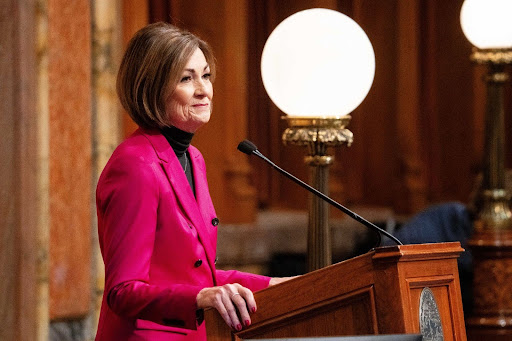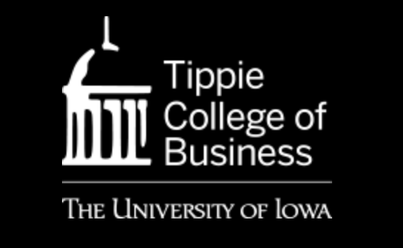5 takeaways from Gov. Reynolds’ 2025 Condition of the State address for Iowa businesses

Mike Mendenhall Jan 15, 2025 | 11:55 am
5 min read time
1,257 wordsAll Latest News, Government Policy and LawIowa Gov. Kim Reynolds’ eighth Condition of the State address on Tuesday night was a checklist of economic proposals ranging from expanded pilot programs in child care affordability and access to further reducing taxes on business, addressing the state’s physician shortage, finding local government efficiencies and exploring nuclear energy.
She touted what she said was $217 million in taxpayer savings in 18 months from her administration’s consolidation of government agencies and other efficiencies.
Reynolds also celebrated the implementation of the recent 3.8% flat income tax and the elimination of state income tax on retirement income.
“We’ve transformed the way our state interacts with citizens, businesses and entrepreneurs— shrinking and aligning government so that our tax cuts are sustainable,” Reynolds said.
Here are five economic takeaways from Reynolds’ address at the Capitol to the joint session of the Iowa General Assembly.
Unemployment insurance tax
Reynolds is calling on lawmakers for the second consecutive year to cut the amount of money businesses pay into the state’s unemployment insurance trust fund. Currently, Iowa businesses are taxed up to $38,000 in wages so the state can provide a safety net benefit to unemployed Iowans.
The governor said she wants to see this dropped by half, which she contends would result in $1 billion in savings for Iowa businesses.
In her address, Reynolds said that’s higher than nearly all states in the region, including Illinois, South Dakota and Wisconsin. The state’s unemployment trust fund balance has a nearly $2 billion balance, the ninth highest in the U.S., according to Reynolds.
“Clearly, we’re over-collecting … Instead, employers should keep and reinvest this money into their business, their workers and their communities,” she said.
Reynolds made a similar call to reduce businesses’ unemployment payments during her 2024 Condition of the State address, but her proposal did not find traction in the Legislature. In 2022, lawmakers approved legislation that Reynolds signed to cut the amount of time jobless Iowans could receive benefits from 26 weeks to 16 weeks.
Reducing the unemployment tax is a top legislative priority for Iowa business industry groups heading into the 2025 session.
Nicole Crain, president of the Iowa Association of Business and Industry, told the Business Record on Jan. 8 that it’s a common misconception that workers pay into Iowa’s unemployment trust fund rather than it being a tax on businesses.
“ABI has long been an advocate of ensuring that we have a sound Unemployment Insurance Trust Fund, and that those individuals who’ve lost their job through no fault of their own can make sure that they’re compensated,” Crain said.
“We definitely want to be supportive. … If you look at the trust fund, there’s a lot of money in there, and how do we make sure that they’re not over-collecting those premiums, and the premiums and the benefits even out?” Crain said.
Property taxes and an Iowa ‘DOGE’
Reynolds did not offer a detailed proposal in her address on how the state could make further reforms to property tax rates, a top priority for Republican legislators this session.
Her only mention of property taxes during the address was included in her announcement of the creation of a state-level Department of Government Efficiency, which will be led by Sukup Manufacturing General Counsel Emily Schmitt.
The committee, which Reynolds said will continue a push to find efficiencies and cost savings in state and local Iowa governments, is a nod to President-elect Donald Trump’s proposed independent federal budget oversight “DOGE” committee led by billionaire Tesla, X and SpaceX CEO Elon Musk and entrepreneur Vivek Ramaswamy.
Reynolds linked future findings of the proposed Iowa DOGE and the success of any property tax reform proposal in the Legislature.
“I like to say that we were doing DOGE before DOGE was a thing,” Reynolds said. “And to build on our success, I’m launching our own state DOGE, to find even greater savings and efficiencies in both state and local government. Because to pass meaningful property tax reform, we also need to be lean at the local level.”
Republicans in Iowa have been aggressive on pursuing tax cuts in recent years. During the 2023 sessions, Iowa lawmakers approved House File 718, which capped property tax levy rates for cities and counties based on their growth, created a $6,500 homestead exemption for property taxpayers over the age of 65 by fiscal year 2027 and an exemption for veterans.
Child care access and costs
Reynolds made several proposals to address child care access and cost, a recurring legislative priority of several Iowa business groups.
The governor proposed launching a statewide Childcare Solutions Fund based on a recent pilot program launched in 10 Iowa communities that allows businesses, philanthropists and nonprofits to contribute funds to boost wages for child care workers.
As part of the pilot program, working with the Iowa Women’s Foundation, the state contributed $3 million to facilitate the creation of the regional community solutions funds, Reynolds said.
She also proposed making a state pilot program that provides free child care to child care workers, aimed at decreasing staff turnover.
A third child care proposal would establish a Continuum of Care program managed by Early Childhood Iowa that will provide three-year grants for preschool programs and child care providers that come together to integrate their services.
Reynolds said the funds could be used toward transportation costs to bring the children from school to the child care facility.
“Parents need a solution that meets the demands of their busy lives — one that allows their children to benefit from our successful preschool program and have access to child care,” Reynolds said. “It’s about more than convenience; it’s about offering our children the educational foundation they need while giving parents peace of mind that their children are cared for throughout the work day.”
Groups like the United Way of Central Iowa, the Greater Des Moines Partnership and the Iowa Business Council have positioned the need for more funding and access to affordable child care as a barrier to growing the state’s labor force.
Health care access and workforce
The governor also announced several broader health care initiatives, including incentivizing health care providers to locate in rural Iowa, increase the number of residencies and cancer research.
Reynolds proposed consolidating the state’s loan repayment program for physicians and doubling the state’s investment to $10 million, as well as opening it to practitioners who commit to practicing in rural Iowa for five years.
She said the Iowa Department of Health and Human Services will launch a program, in partnership with Broadlawns and the University of Iowa, to secure over $150 million in federal funds to create a projected 115 new residency slots each year in Iowa’s 14 teaching hospitals.
Reynolds is also asking the Legislature to appropriate $1 million as a seed investment in a partnership between Iowa HHS and the University of Iowa to establish a team of epidemiologists who will research the behavioral, genetic and environmental factors of Iowa’s rising cancer rates.
Energy
The address also touted Iowa’s renewable energy and biofuels industries, with a push from the governor to expand into other forms, including nuclear.
Reynolds said she wants to put together a task force to explore the possibility of nuclear energy in Iowa.
“I’ll be bringing together experts to look at issues like permitting, which often takes too long,” she said. “They’ll also look at workforce challenges, because recruiting nuclear engineers doesn’t happen overnight. And they’ll be talking with stakeholders around the state to make sure we have local buy-in.”
Reynolds will also propose a bill that she said will “promote an all-of-the-above energy portfolio.”
“We want to send a message to businesses: Invest in Iowa, and you won’t regret it. You’ll have the workforce, the energy infrastructure, and the low cost of doing business to compete with any company in the world,” Reynolds said.

Mike Mendenhall
Mike Mendenhall is associate editor at Business Record. He covers economic development, government policy and law.











